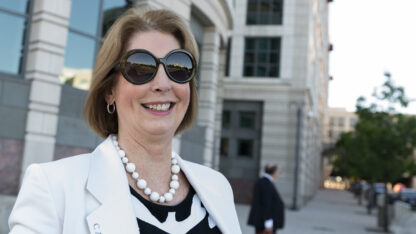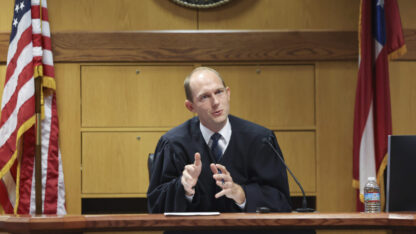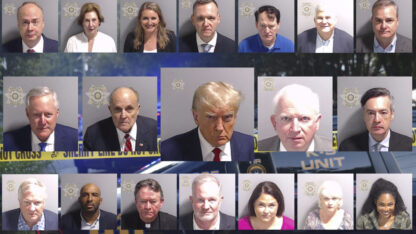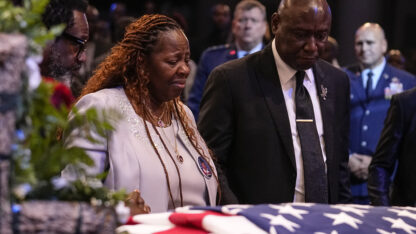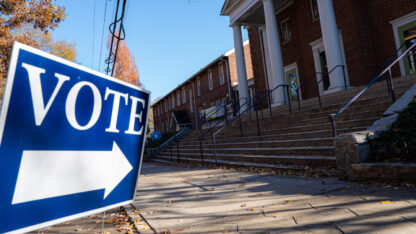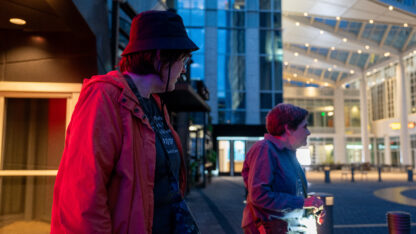Jury selection begins for Kenneth Chesebro, first Trump co-defendant in Georgia election interference case

Three years after the 2020 election, a lawyer indicted in Georgia alongside former President Trump will be the first of 19 co-defendants to face trial for conspiring to disrupt the transfer of power.
Jury selection begins this week for Kenneth Chesebro, an ally of the former president who was charged in a sprawling racketeering case brought by prosecutors in Fulton County.
Another former lawyer for Trump, Sidney Powell, had also been slated for trial next week. On Thursday, she pleaded guilty to six misdemeanor counts of conspiracy to commit intentional interference with performance of election duties, in exchange for her truthful testimony.
Chesebro helped hatch a plan to submit slates of Trump electors from closely-contested states carried by Joe Biden.
Chesebro will be the first co-defendant to face a jury because he demanded a speedy trial under Georgia law, which requires the trial begin within a specific window.
A jury must be sworn-in by the end of this window, which would be Nov. 5, or the charges against him have to be dropped.
Another defendant, bail bondsman Scott Hall, agreed to a guilty plea in exchange for his testimony.
Fulton Superior Judge Scott McAfee, who is overseeing the case, has yet to set a trial date for Trump and the remaining co-defendants.
But Atlanta attorney Chris Timmons, who has tried RICO cases for 17 years, says Trump will still be at the center of this first trial.
“I make no bones about it,” Timmons says. “This is a Trump trial.”
Prosecutors plan to present the entirety of their case, not just the alleged crimes committed by Chesebro. That’s because racketeering, or RICO, cases hinge on showing a pattern of people commiting specific, underlying crimes in pursuit of a common goal.
So even though Trump won’t be tried until later, that infamous January 2021 call, for example, when Trump pressured Georgia Secretary of State Brad Raffensperger to find votes, will certainly be a part of the story prosecutors tell about what unfolded after the 2020 election.
Prosecutors will have to try the case at least one more time when the other co-defendants go to trial, which has upsides and downsides, experts say.
On the one hand, prosecutors will have to lay the narrative of their case out in the open, for everyone including the other defendants’ attorneys to see. They also run the risk of witness testimony not matching up between the two trials.
But Timmons say it’s also a chance for prosecutors to work out the knots in their case before trying a former president.
“It’s a dress rehearsal, and you’ve got less pressure,” he says.
Prosecutors expect to call more than 150 witnesses and estimate the trial will last three and five months.
Picking a jury
On Friday, 450 Fulton County residents will report for jury duty at the Fulton County Courthouse, beginning the tedious process of seating an impartial, 12-person jury.
“I can’t emphasize enough how important jury selection is,” Timmons says. “It’s everything. The most important part of any decision is the decider.”
Jury selection is important – and can also be challenging.
Most people have some opinion about Trump and the 2020 election. And anyone who follows the news even a little bit likely has some awareness of the people and activities at the center of the indictment.
But identifying that rare juror who has lived under a rock for the last three years of Georgia politics is not anyone’s expectation.
Timmons, who has quizzed potential jurors as a prosecutor and a defense attorney and teaches a class on jury selection at Georgia State University Law School, says the requirement is selecting jurors who can be fair.
“The law in the state of Georgia is that you have to find jurors whose opinions are changeable,” Timmons says. “It’s okay for jurors to come in with opinions. Everybody has opinions about things that are happening in the world.”
But figuring out whose opinions are truly changeable is tricky.
To begin, potential jurors fill out a questionnaire so lengthy, the judge has set aside two hours for prospects to complete it. Prosecutors and defense attorneys will then pour through the surveys before they have a chance to pepper the prospects with follow-up questions on Monday.
In pre-trial hearings, attorneys jockeyed over the questionnaire.
The judge allowed a question asking whether potential jurors would feel nervous about returning a verdict based on how the public would respond. A section asking potential jurors to rate whether they felt favorable or unfavorable about specific co-defenders in the broader case was nixed.
The survey will also ask potential jurors about their politics, their opinions about District Attorney Fani Willis and where they get their news.
The jury selection process can be lengthy. Another Fulton County racketeering case, brought against alleged members of the “Young Slime Life” gang, has yet to seat a jury after nine months. Timmons says that’s likely due to the difficulty finding jurors who don’t have preconceived notions about gangs and people who can commit to such a lengthy trial.
Judge McAfee has said he hopes to be able to begin the meat of Chesebro’s trial by Nov. 6.
Each side has only a limited number of strikes they can use to dismiss a potential juror for any reason, except an unlawful one like race or sex. Say one side is skeptical of jurors with facial hair – that’s fair game for a strike.
But attorneys have unlimited strikes for cause, when a preponderance of evidence suggests a potential juror cannot render a fair verdict.
“Is this person so anti-Trump that if they found out that he did something wonderful and altruistic, they would turn around and say he did that for his own benefit?” Timmons says. “Flip side of that, you find someone who loves Trump so much that they see a video of him with a gun to one of the electors’ heads, and that person would say that’s got to be photo-shopped.
That’s what you’re looking for – the jurors who are so cognitively biased they cannot accept information contrary to their world view.”
The courts are also grappling with how to ensure the jurors’ safety.
Judge McAfee has agreed to some provisions that will help shield their identities, like prohibiting the disclosure of any of their personal information during the trial.
That move came after members of the grand jury that indicted Trump were threatened and harassed.
And now, prosecutors in Washington are asking for similar precautions in the federal Trump case, citing the former president’s “continued use of social media as a weapon of intimidation” in court proceedings.
First Trump co-defendant
Chesebro is facing charges related to the so-called “fake elector” plan, which prosecutors say was part of a broader plan to help keep Trump in office after he lost the 2020 election to Biden.
Chesebro is facing seven felony charges, including a racketeering charge which can carry up to 20 years in prison.
In the indictment, prosecutors outline how after Biden had been declared the winner of the election, Chesebro wrote to Republicans in Georgia and other states saying he had been asked by the Trump campaign to help coordinate the logistics of Trump electors casting their electoral votes.
Prosecutors allege that Chesebro and others conspired to submit a fraudulent slate of electors for Trump, even though it was Biden who won Georgia’s 16 electoral votes.
In one email, Chesebro wrote that “the purpose of having the electoral votes sent in to Congress is to provide the opportunity to debate the election irregularities in Congress, and to keep alive the possibility that the votes could be flipped to Trump.”
Chesebro is also charged with conspiracy to impersonate a public officer, conspiracy to commit forgery in the first degree, conspiracy to commit false statements and writings and conspiracy to commit filing false documents.
Chesebro’s lawyers say his actions were consistent with federal election law because the Electoral Count Act discusses Congress receiving multiple slates of electors.
Chesebro’s lawyers have unsuccessfully petitioned the court to dismiss the charges against him, meaning his trial will move ahead.
The proceedings will also be notable because they will be live-streamed on YouTube and carried by television networks.
Timmons thinks that’s a good thing.
“I think we have the greatest legal system in the world,” he says. “It’s imperfect. But I think this is a great opportunity for America to see how a trial works and how a trial should work. You’ve got a great judge, you’ve got great prosecutors, you’ve got great defense attorneys.”
